
JOURNAL OF ORNITHOLOGY
Scope & Guideline
Exploring the Wonders of Avian Life
Introduction
Aims and Scopes
- Avian Ecology and Behavior:
Research on the ecological interactions and behavioral patterns of birds, including nesting habits, foraging strategies, and social dynamics. - Conservation Biology:
Studies addressing the conservation status of bird species, habitat restoration, and the impact of environmental changes on avian populations. - Migration and Movement Patterns:
Investigations into the migratory routes, timing, and strategies of various bird species, with a focus on the effects of climate and habitat on migratory behavior. - Physiological and Morphological Studies:
Research exploring the physiological adaptations of birds to their environments, including studies on plumage coloration, body condition, and reproductive strategies. - Citizen Science and Monitoring:
Utilization of citizen science data and monitoring schemes to assess bird populations, distribution changes, and community engagement in ornithological research. - Evolutionary Biology and Phylogeography:
Exploration of the evolutionary relationships among bird species, including studies on genetic diversity, hybridization, and historical biogeography.
Trending and Emerging
- Climate Change Impacts on Birds:
An increasing number of studies explore the effects of climate change on bird distribution, breeding success, and migratory behavior, highlighting the urgency of understanding these impacts. - Citizen Science Contributions:
There is a growing trend in utilizing citizen science data to enhance research quality and public engagement, indicating a shift towards collaborative approaches in ornithology. - Behavioral Ecology in Urban Environments:
Research focusing on how urbanization affects bird behavior and ecology is on the rise, addressing the challenges birds face in increasingly human-dominated landscapes. - Physiological Responses to Environmental Stressors:
Emerging studies examine how environmental stresses, such as pollution and habitat loss, influence physiological traits and health in bird populations. - Conservation Genetics and Genomics:
An increase in studies utilizing genetic tools to inform conservation strategies reflects a trend towards integrating genomic data into avian conservation efforts.
Declining or Waning
- Historical Avian Fossil Studies:
Research on ancient avian fossils has decreased, possibly due to a shift towards more contemporary ecological and conservation issues. - Urban Ecology of Non-native Species:
Studies focused on the urban ecology of invasive bird species have become less frequent, indicating a potential shift towards more native-focused research. - Traditional Taxonomy and Systematics:
There appears to be a waning interest in classical taxonomy and systematics in favor of molecular and genetic approaches to avian classification.
Similar Journals
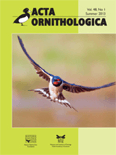
ACTA ORNITHOLOGICA
Bridging the gap between avian research and real-world impact.ACTA ORNITHOLOGICA is a prominent peer-reviewed journal dedicated to advancing the field of ornithology. Published by the MUSEUM & INST ZOOLOGY in Poland, the journal focuses on a wide array of topics related to avian biology, ecology, and conservation, supporting the dissemination of high-quality research aimed at understanding bird populations and their habitats. With a respectable impact factor reflected in its Q3 rank within the fields of Animal Science and Zoology, ACTA ORNITHOLOGICA stands as a reliable source for professionals and academics alike. The journal is indexed in major databases like Scopus, further contributing to its visibility and accessibility to scholars worldwide. Engaging with this journal provides researchers and students with invaluable insights and opportunities to contribute to the growing body of knowledge in ornithological studies as it continues to maintain its commitment to excellence and relevance in the scientific community from its inception in 1981.

Avian Biology Research
Bridging gaps in knowledge about avian physiology and conservation.Avian Biology Research, published by SAGE PUBLICATIONS LTD, is a leading journal dedicated to advancing the study of avian species through high-quality, peer-reviewed research. With an ISSN of 1758-1559 and an E-ISSN of 1758-1567, this journal has established itself as a vital resource within the fields of Animal Science and Zoology, as well as Ecology, Evolution, Behavior, and Systematics. The journal is currently ranked Q3 in both categories according to the 2023 release of the category quartiles, and it contributes significantly to the global understanding of avian biology, including behavior, physiology, and conservation efforts. Positioned within the competitive landscape of the Scopus rankings, it finds itself amidst a diverse array of research, with medical and environmental implications. As an open-access journal, Avian Biology Research ensures greater accessibility to its contents, fostering disseminative opportunities for researchers, professionals, and students alike. With a publication window spanning from 2008 to 2024, it continues to be an invaluable platform for the dissemination and dialogue of avian research, thereby enlightening future inquiries and driving scientific advancements in this crucial area of biology.
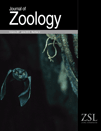
JOURNAL OF ZOOLOGY
Bridging foundational research with innovative zoological studies.JOURNAL OF ZOOLOGY, published by Wiley, stands as a premier scholarly journal in the fields of Animal Science and Zoology, renowned for its outstanding contributions to the knowledge of animal biology and ecology. With an impressive impact factor and a strong ranking in the Q1 category for Animal Science and Zoology, as well as Q2 for Ecology, Evolution, Behavior, and Systematics, the journal rigorously engages with both foundational research and groundbreaking discoveries since its inception in 1830. Located in Hoboken, New Jersey, this journal is dedicated to fostering the academic community's understanding of zoological sciences, providing access to important research that shapes wildlife conservation efforts and ecological studies. Although the journal does not currently offer open access options, it continues to attract significant attention, as evidenced by its strong Scopus rankings in related categories. Researchers, professionals, and students will find invaluable resources in the JOURNAL OF ZOOLOGY to advance their understanding of animal life and the ecological challenges it faces today.

AUSTRALIAN JOURNAL OF ZOOLOGY
Innovating Conservation Through Research and DiscoveryAustralian Journal of Zoology, published by CSIRO PUBLISHING, serves as a premier platform for research in the fields of animal science and zoology, with a profound commitment to advancing our understanding of wildlife and ecosystems. Featuring an ISSN of 0004-959X and an E-ISSN of 1446-5698, this esteemed journal encompasses a wide range of topics relevant to ecology, evolution, behavior, and systematics. For the year 2023, it holds a commendable Q2 ranking in both Animal Science and Zoology and Ecology, Evolution, Behavior, and Systematics, demonstrating its significant impact within the academic community. With a rich publication history spanning from 1952 to 2024, the journal caters to researchers, professionals, and students by disseminating crucial findings and methodologies that contribute to effective conservation efforts and informed ecological practices. Although not an open access journal, it continues to foster collaboration and discussion among scholars in Australia and beyond. Located in Clayton, Victoria, the journal remains dedicated to its objective of enhancing knowledge in zoological sciences and addressing vital environmental challenges.

ORNITOLOGIA NEOTROPICAL
Advancing Neotropical avian research for a sustainable future.ORNITOLOGIA NEOTROPICAL is a vital journal dedicated to advancing the field of Neotropical ornithology, published by the esteemed Neotropical Ornithological Society in collaboration with the USGS Patuxent Wildlife Research Center. With an ISSN of 1075-4377, this journal serves as a platform for researchers, professionals, and students to disseminate important findings related to avian biodiversity, ecology, and conservation in the Neotropical region. Although currently classified in Q4 quartiles for both Animal Science and Zoology and Ecology, Evolution, Behavior and Systematics, ORNITOLOGIA NEOTROPICAL has been gaining recognition since its inception in 2005. The journal promotes open discussions and rigorous methodologies that significantly contribute to the understanding and protection of avian species. By facilitating accessibility to cutting-edge research and fostering a collaborative scientific community, ORNITOLOGIA NEOTROPICAL aims to enhance the impact and importance of ornithological studies in the Neotropical domain.
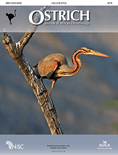
OSTRICH
Connecting Science and Conservation through Avian StudiesOSTRICH, a distinguished journal published by Taylor & Francis Ltd, serves as a pivotal platform for disseminating research in the fields of ecology, evolution, behavior, and systematics. With an ISSN of 0030-6525 and an E-ISSN of 1727-947X, this journal has been contributing vital insights to the scientific community since its inception in 1930. Maintained in the UK, OSTRICH holds a respectable Q3 category ranking in the 2023 Ecology, Evolution, Behavior, and Systematics quartiles and ranks 408th out of 721 within its scientific domain according to Scopus, showcasing a competitive position within the 43rd percentile. OSTRICH is committed to publishing high-quality research that informs conservation efforts and biodiversity studies, making it an essential resource for researchers, professionals, and students interested in avian biology and related ecological fields. While not currently an open-access journal, OSTRICH offers varied access options through institutions and libraries, further widening its reach and impact within the scientific community. We invite academics and practitioners to explore its valuable articles that drive forward innovations in avian research.
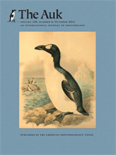
Ornithology
Innovating Research in Avian Ecology.Ornithology, published by Oxford University Press Inc, is a premier journal dedicated to the field of avian biology, offering a platform for researchers, professionals, and students to share groundbreaking findings in the study of birds. With an impressive impact factor and ranking in the Q1 quartile for both Animal Science and Zoology, as well as Ecology, Evolution, Behavior, and Systematics, Ornithology serves as a vital resource for advancing our understanding of avian species and their ecological roles. The journal allows open access viewing, broadening the reach and impact of published research. Covering comprehensive studies from 1982 to 2023, it facilitates collaboration and innovation within the global ornithological community. Engaging with Ornithology not only elevates your research profile but also contributes to the rich tapestry of knowledge concerning the world's diverse bird populations.
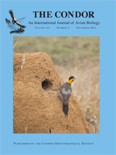
Ornithological Applications
Fostering collaboration in the pursuit of ornithological excellence.Ornithological Applications, published by Oxford University Press, is a premier academic journal dedicated to advancing the field of ornithology through innovative research and practical applications. With an impressive impact factor and recognized as a Q1 journal in both Animal Science and Zoology as well as Ecology, Evolution, Behavior and Systematics, it ranks among the top journals in its field, holding significance for researchers, professionals, and students alike. With a historical publication span from 1981 to the present, this journal has solidified its reputation for disseminating high-quality articles that explore avian biology, conservation, and management strategies. For those interested in open access publishing options, please check the title change details. As a vital resource, Ornithological Applications serves as a cornerstone for professionals looking to enhance their understanding of avian science and its critical applications in today's rapidly changing ecosystems.

ZOOLOGICHESKY ZHURNAL
Unveiling the mysteries of behavior and systematics in the animal kingdom.Zoologichesky Zhurnal, a prominent journal in the field of Ecology, Evolution, Behavior and Systematics, has been a vital publication since its inception in 1950. Published by MAIK Nauka-Interperiodica in the Russian Federation, this journal has established a notable reputation in disseminating scientific research and advancing knowledge in zoology. With its coverage spanning from 1950 to 2023, and a specific convergent focus during 1982-1983, this journal contributes significantly to the ecological and evolutionary sciences, even though it currently holds a Q4 classification in the 2023 category quartiles, indicating its niche positioning among peers. Researchers and students engaged in the study of biological sciences, particularly those interested in the dynamics of ecosystems, behavior of species, and evolutionary processes, will find valuable insights and original research articles within its pages. While access to this esteemed journal is not open, it remains an essential resource for those seeking to deepen their understanding of zoological sciences.

MALIMBUS
Advancing avian science through rigorous research.MALIMBUS is a peer-reviewed journal published by the West African Ornithological Society, focusing on the study of avian biology and conservation. It aims to disseminate important research findings that contribute to the understanding of bird species, their habitats, and the challenges they face across West Africa and beyond. Although currently not available in an open-access format, the journal is an invaluable resource for ornithologists, ecologists, and industry professionals keen on advancing their understanding of avian science. Those engaged in research on bird migration, breeding behaviors, and conservation strategies will find MALIMBUS to be a vital platform for sharing innovative ideas and fostering collaborations. With its commitment to quality and rigorous review processes, MALIMBUS is an essential reference for anyone dedicated to studying and preserving avian diversity.